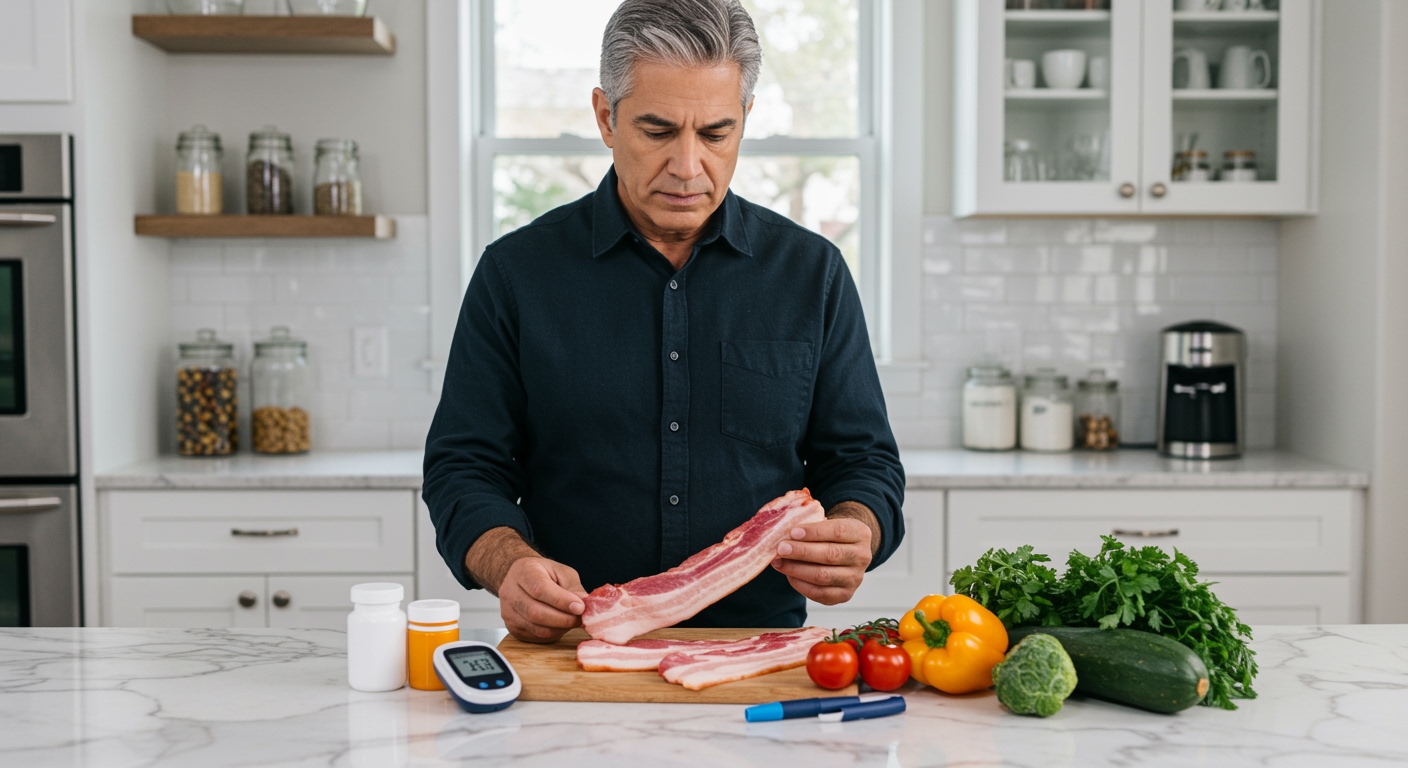✪ Key Takeaway: Bacon has minimal blood sugar impact but increases diabetes complications through inflammation and heart disease risk.
Introduction
You smell bacon sizzling in the pan and wonder if this crispy temptation will send your blood sugar through the roof.
Many people with diabetes ask this question because they want to enjoy their favorite foods without compromising their health.
Hi, I am Abdur, your nutrition coach and today I am going to explain exactly how bacon affects diabetes and what you need to know before adding it to your plate.
Does Bacon Raise Blood Sugar Levels?
Bacon has a glycemic index of zero, which means it does not directly raise your blood sugar levels.
This happens because bacon contains virtually no carbohydrates, the main nutrient that affects blood glucose.
A typical two-slice serving of bacon contains less than one gram of carbs, making it technically diabetes-friendly from a blood sugar perspective.
However, the protein and fat in bacon can cause a delayed glucose response in some people through a process called gluconeogenesis.
Your liver can convert excess protein into glucose several hours after eating, which may cause a gradual blood sugar rise.
This delayed effect varies greatly between individuals and depends on factors like insulin sensitivity and overall meal composition.
✪ Pro Tip: Monitor your blood sugar 3-4 hours after eating bacon to catch any delayed glucose response.
What Makes Bacon Risky For Diabetes?
The real danger of bacon for diabetes lies not in blood sugar spikes but in long-term complications.
Processed meats like bacon contain high levels of sodium, nitrates, and saturated fats that promote chronic inflammation throughout your body.
Research shows that eating processed meat regularly increases your risk of developing type 2 diabetes by 19 percent.
The nitrates used to preserve bacon can interfere with insulin function and contribute to insulin resistance over time.
High sodium content in bacon can worsen blood pressure problems, which already affect 70 percent of people with diabetes.
The saturated fat content promotes cardiovascular disease, the leading cause of death among people with diabetes.
These factors make bacon a poor choice for long-term diabetes management despite its minimal blood sugar impact.
✪ Fact: People with diabetes are twice as likely to die from heart disease compared to those without diabetes.
How Much Bacon Is Safe For Diabetics?
The American Diabetes Association recommends limiting processed meats to occasional treats rather than regular meals.
If you choose to eat bacon, stick to one or two slices per serving and limit consumption to once or twice per week maximum.
Choose uncured bacon without added nitrates when possible, though it still contains natural nitrates from celery powder.
Turkey bacon offers a slightly better option with less saturated fat, but it still contains high sodium and preservatives.
Canadian bacon provides more protein with less fat per serving compared to regular bacon strips.
Always pair bacon with fiber-rich vegetables and avoid combining it with refined carbohydrates like white bread or pancakes.
Consider bacon as a flavoring agent rather than a main protein source to minimize health risks while still enjoying the taste.
✪ Note: One slice of bacon contains about 190 milligrams of sodium, nearly 10 percent of your daily limit.
What Are Better Protein Options For Diabetes?
Focus on lean proteins that provide essential nutrients without the health risks associated with processed meats.
Skinless chicken breast, turkey, and fish offer high-quality protein with minimal saturated fat and no preservatives.
Fatty fish like salmon, mackerel, and sardines provide omega-3 fatty acids that actually reduce inflammation and support heart health.
Plant-based proteins such as beans, lentils, and tofu offer fiber along with protein, helping stabilize blood sugar levels.
Eggs provide complete protein and can be prepared in countless ways without adding harmful preservatives.
Greek yogurt delivers protein plus probiotics that may improve insulin sensitivity and gut health.
These alternatives give you satisfying meals while supporting your diabetes management goals rather than working against them.
✪ Pro Tip: Aim for at least two servings of fatty fish per week to maximize anti-inflammatory benefits.
The Bottom Line
Bacon might not spike your blood sugar immediately, but it creates long-term health risks that far outweigh any short-term benefits for people with diabetes.
Smart food choices today prevent serious complications tomorrow, and bacon simply does not fit into a diabetes-friendly eating pattern when consumed regularly.
I would love to hear your thoughts on this topic or answer any questions you might have about managing diabetes through nutrition, so please share your experiences in the comments below.
References
At NutritionCrown, we use quality and credible sources to ensure our content is accurate and trustworthy. Below are the sources referenced in creating this article:
- Nutrisense: Will Bacon Raise Blood Sugar
- January AI: Bacon Glycemic Index
- Harvard Health: Processed Meats Come With Increased Risk
- Food Struct: Bacon and Diabetes





